The 4 Best Keto Sweeteners
This recipe may contain Amazon or other affiliate links. As an Amazon Associate I earn from qualifying purchases.
The Keto Diet requires reducing the number of carbs consumed every day, in order to keep the body in ketosis. Ketosis is a state where the lack of carbohydrates in the bloodstream forces the body to transform its stored fat into energy.
As a result, it’s absolutely critical to reducing the carbohydrate intake to about 15g to 30g of net carbs per day. And therefore there is a need to find alternative ingredients to sweeten the food to keep the sweet taste we know and love.
But what are the different sweeteners? What are the best keto sweeteners? What are the other health effects of these sweeteners? Can I swap a sweetener for another one? How do I convert volumes from one sweetener to the other?
Read on, and we’ll tell you what you need to know about the best keto-friendly sweeteners.
What are the different types of low-carb sweeteners?
Sweeteners, also called sugar substitutes are food additives that are used to provide a sweet taste. They are essential to your keto cake recipes or keto cookies to give them the sweet flavor you expect.
There are three main families of sweeteners:
- Sugar Alcohols: derived from sugar. E.g. Erythritol, Xylitol, Sorbitol, etc.
- Artificial Sweeteners: sweeteners manufactured by chemical synthesis. E.g. Aspartame, Sucralose, Neotame, Saccharin.
- Natural Sweeteners: still manufactured, but instead of being 100% artificial, the main components of these sweeteners come from plant extracts. E.g. Stevia, Monk Fruit, Allulose, Inulin, Tagatose
In this article, we’ll look into each of the alternative sweeteners. We’ll find out if these sweeteners are keto-friendly by looking at how much net carbs they have and we’ll rank the most keto-friendly sweeteners.
However net carbs per 100g can be a tricky measure. For example, if you need just a teaspoon of a sweetener to get the same sweetness as 100g of sugar, it’s unfair to compare the same mass or the same volume.
What matters is to compare the net carbs needed to reach the same level of sweetness as 100g of sugar.
Note that manufacturers often include sweeteners with a code instead of their name (E9XX). To help you find what you are consuming, you can find the code for each of them below.
Sugar Alcohols
Xylitol, Sorbitol, Maltitol, Erythritol, Lactitol, etc.
Sugar alcohols are chemically very close to normal sugar. The term alcohol has nothing to do with alcoholic drinks, but it refers to the presence of a hydroxy on their molecule – the chemical definition of alcohol. So do not worry, you can’t get intoxicated on sugar alcohols.
In their normal form, sugar alcohols are white crystals – like normal sugar, they dissolve in water. The relative sweetness of sugar alcohols is between 60% and 90% which explains why you generally need to put more of it to replace sugar in your recipes.
The body absorbs Sugar alcohol at half the rate of sugar which therefore also reduces the blood sugar impact of their consumption compared to normal sugar.
- Fun fact: Dissolving sugar alcohols in water is an endothermic reaction, meaning that it absorbs energy. So when you eat sugar alcohol crystals, you get a cooling sensation on the tongue.
- Nasty fact: Many sugar alcohols are not completely digestible and therefore might lead to bloating and flatulence.
- Good fact: Sugar alcohols – unlike sugar – do not contribute to tooth decay. In fact, Xylitol might even help prevent tooth decay!
- Cooking fact: sugar alcohols do not brown when cooked so you won’t get caramel with them.
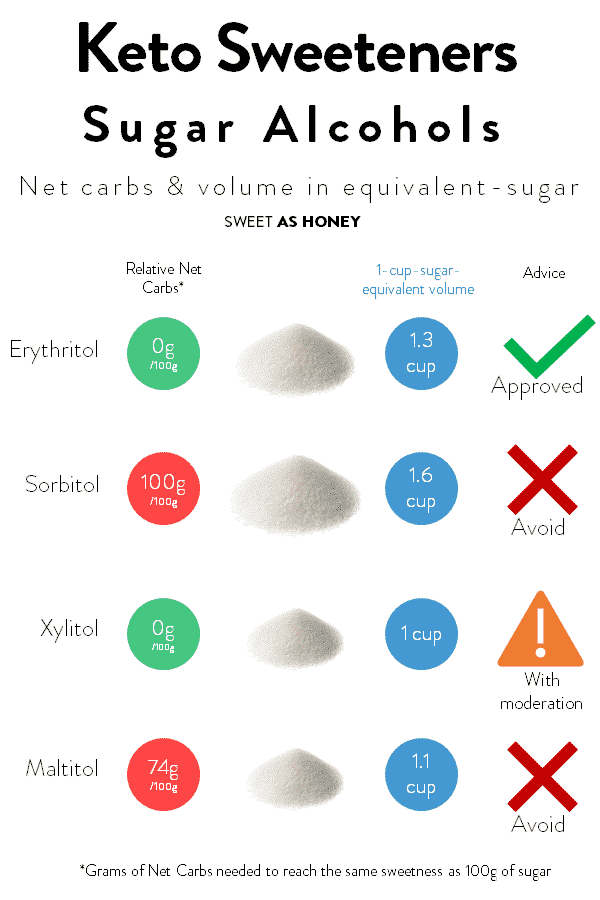
Erythritol (E968)
Net Carbs:0g/100g
- Weight needed to get the same sweetness as 100g sugar: 130g => Net carbs for 130g: 0g
- Maximum recommended intake: 0.8g/kg or 0.36g/lbs
What is Erythritol? Also known as E968, Erythritol shares some characteristics with the other sugar alcohols but it’s by far the best. With a sweetness equivalent to about 75% of the same amount of sugar, it’s quite sweet.
But that’s where similarities with other sugar alcohols stop. Indeed, its glycemic index is null, it’s, therefore, a perfect substitute to sugar for diabetic diets. It is also better absorbed into the bloodstream than other sugar alcohol with only 10% reaching the colon.
Therefore it has a far lower laxative effect than xylitol or sorbitol. But most importantly for Keto dieters, Erythritol does not turn into sugar in your body, and thus its net carbs and calories are null. Erythritol is most often available as a sugar-free crystal sweetener.
A recent study from the Cleveland Clinic highlighted that Erythritol might increase the risk of cardiac event.
While this study is legit, it highlights the fact that more investigations are still needed to thoroughly assess its dangerosity.
For all these reasons, Erythritol is on top of our list of most keto-friendly sweeteners.
- Commercial brands selling Erythritol (affiliate links): Swerve Granular Sweetener, Z SWEET All Natural Zero Calorie Sweetener, Wholesome Sweeteners Organic Zero, Anthony’s Erythritol Granules
- Is Erythritol Keto Friendly? Yes
Sweet As Honey Score: 10/10 (no net carbs, easy to swap)
Xylitol (E967)
Net Carbs: 0g/100g
- Weight needed to get the same sweetness as 100g sugar: 100g => Net carbs for 100g: 0g
- Maximum recommended intake: 0.4g/kg or 0.18g/lbs
Also known as E967, the Xylitol is often produced from wood – hence the name since “xylon” means “wood” in Ancient Greek. Another source of Xylitol is agricultural waste, making it a renewable chemical.
It’s just as sweet as sugar but provides 40% fewer calories than sugar. The body however doesn’t metabolize calories coming from Xylitol, so it just passes through! It also remains stable under heat so it’s baking-friendly.
Xylitol has a very low GI of only 12 (while sugar is at 100), therefore it’s an approved sugar replacement for diabetes. Xylitol has one of the strongest bloating effects of sugar alcohols, so if you are easily bloated, avoid it!
Nasty fact: Xylitol can be life-threatening for some animals – 1g can be lethal for a 10kg dog!
- Commercial brands selling Xylitol: NOW Foods Xylitol, Xlear XyloSweet, Anthony’s Xylitol Sweetener, Morning Pep Pure Birch Xylitol
- Is Xylitol Keto Friendly? Yes
Sweet As Honey Score: 5/10 (no net carbs, but some undesirable effects)
Sorbitol (E420)
Net Carbs: 62g/100g
- Weight needed to get the same sweetness as 100g sugar: 160g => Net carbs for 160g: 100g
- Maximum recommended intake: 0.7g/kg or 0.31g/lbs
Also known as E420, Sorbitol is very similar to glucose. It’s generally made from potato starch. It’s about 60% less sweet than sugar and Xylitol and therefore a larger amount is needed to get the same taste.
Because its net carbs are quite high and more of it is required to get the same sweetness, Sorbitol is a terrible replacement for sugar on a Ketogenic diet.
To get the same sweetness as 100g of sugar, you would need 160g of Sorbitol that contains 100g of net carbs! Not worth it! However, Sorbitol has a GI of 9 making it an accepted sugar replacement for diabetes.
- Sorbitol is not sold as a standalone product.
- Is Sorbitol Keto Friendly? No
Sweet As Honey Score: 0/10 (high carbs)
Maltitol (E965)
Net Carbs: 67g/100g
- Weight needed to get the same sweetness as 100g sugar: 111g => Net carbs for 111g: 74g
- Maximum recommended intake: 1.4g/kg or 0.63g/lbs
Maltitol, also found under the code E965, is another nasty sugar alcohol. Its sweetness is 90% as high as sugar, but it has the highest glycemic index of all sugar alcohols (between 35 and 52), making it unusable for diabetics.
Its laxative effect is also quite strong but most importantly its net carbs are quite high. Given its high sweetness, the relative net carbs are slightly lower than for Sorbitol though.
- Commercial brands selling Maltitol: SweetPearl
- Is Maltitol Keto Friendly? No
Sweet As Honey Score: 0/10 (high carbs)
Is sweetener 965 keto? No, not at all!
Artificial Sweeteners
Aspartame, Sucralose, Neotame, Acesulfame-K, Saccharin, Advantame, etc.
The list of artificial sweeteners is long and varied, however, we can trim it down quite a bit by looking at the ones that are currently approved for use in food manufacturing.
One thing to note about artificial sweeteners is that they are all somewhat controversial. Many of them have potentially dangerous side effects.
There is no suspense, none of the artificial sweeteners are in the most keto-friendly sweeteners.
Aspartame (E951)
Net Carbs: 85g/100g
- Weight needed to get the same sweetness as 100g sugar: 0.5g=> Net carbs for 0.5g: 0.4g
- Maximum recommended intake: 0.05g/kg or 0.02g/lbs
Aspartame, also known as E951 is one of the most common sweeteners, present in many “diet” drinks, sugar-free gums, candies, ketchup, etc.
Although many people believe that it to be sugar-free, it is not. In fact, its net carbs are super high at 85g per 100g. However, its high level of sweetness saves it, about 200 times higher than sugar.
Therefore, only half a gram of Aspartame brings the same level of sweetness as 100g of sugar. Aspartame is a fairly controversial product, many studies show that it has no adverse effect on health whole many others show the contrary.
It’s important to note that there are gigantic economic interests at play, because of the size of the aspartame market – so some studies have to be taken with a grain of salt.
- Commercial brands selling Aspartame: Canderel, Equal, NutraSweet Company.
- Is Aspartame Keto Friendly? Yes, technically,
Sweet As Honey Score: 2/10 (very low carbs, but hard to use in baking and cooking)
Sucralose (E955)
Net Carbs:0g/100g
- Weight needed to get the same sweetness as 100g sugar: 0.16g=> Net carbs for 0.16g: 0g
- Maximum recommended intake: 0.005g/kg or 0.002g/lbs
Sucralose, also known as E955 is another artificial sweetener. It is non-caloric because, unlike Aspartame, Sucralose is not broken down by the body during digestion.
Although Sucralose is non-caloric and has a GI of 0, some brands mix it with Maltodextrin lifting the GI above 80, so watch out!
The other thing to know about Sucralose is that it boosts the effects of glucose, were you to eat some sugar after consuming Sucralose. Sucralose almost doubles the glycemic load of sugar.
Sucralose is an incredibly strong sweetener, it’s about 600 times stronger than sugar.
Therefore, only 16 grams of Sucralose bring as much sweetness as 10kg of sugar!
- Commercial brands selling Sucralose: Equal Sucralose, SucraPlus, EZSweet
- Is Sucralose Keto Friendly? Yes, technically (in pure form)
Sweet As Honey Score: 2/10 (no carbs, but very hard to use and health effects)
Acesulfame-K (E950)
Net Carbs: 0g/100g
- Weight needed to get the same sweetness as 100g sugar: 0.5g=> Net carbs for 0.5g: 0g
- Maximum recommended intake: 0.015g/kg or 0.007g/lbs
Acesulfame-K, also known as E950 or Acesulfame-Potassium is quite similar to Aspartame. It was discovered by accident and has the same level of sweetness – 200 times stronger than sugar.
Acesulfame-K is non-caloric and has a GI of 0. Its strong bitter taste makes Acesulfame-K quite difficult to find in pure form, it’s generally sold in blends or in bulk to manufacturers.
- Commercial brands selling 100% Acesulfame-K: Sunett
- Is Acesulfame-K Keto Friendly? Yes
Sweet As Honey Score: 3/10 (no carbs, but hard to use in baking and cooking)
Neotame (E961)
Net Carbs: 0g/100g
- Weight needed to get the same sweetness as 100g sugar: 0.0125g=> Net carbs for 0.0125g: 0g
- Maximum recommended intake: 0.0003g/kg or 0.0001g/lbs
Neotame, also known as E961 is also derived from Aspartame. However, it’s 40 times sweeter than Aspartame, making it 8,000 stronger than sugar. Its glycemic index is 0 and it does not contain any calories. Neotame can cover the bitterness of other sweeteners.
- Neotame is not sold on its own, because of its strength – you would need a commercial-grade scale to weigh the few milligrams needed to sweeten a whole cake!
- Is Neotame Keto Friendly? Yes, technically
Sweet As Honey Score: 1/10 (no carbs, but too hard to work with)
Saccharin (E954)
Net Carbs: 0g/100g
- Weight needed to get the same sweetness as 100g sugar: 0.25g=> Net carbs for 0.25g: 0g
- Maximum recommended intake: 0.015g/kg or 0.007g/lbs
Saccharin, E954, is commonly used in food manufacturing. It’s one of the oldest sweeteners, found at the end of the 19th century. Saccharin is a sweetener often used to mask the bitterness of other sweeteners, despite being bitter on its own. Its glycemic index is 0 and it does not contain any calories.
- Saccharin is not sold on its own but mixed with sugar-free or sugar crystals.
- Is Saccharin Keto Friendly? Yes, technically
Sweet As Honey Score: 1/10 (no carbs, but too hard to work with)
Advantame (E969)
Net Carbs: 0g/100g
- Weight needed to get the same sweetness as 100g sugar: 0.005g=> Net carbs for 0.005g: 0g
- Maximum recommended intake: 0.032g/kg or 0.014g/lbs
Advantame, also known as E969, is the most potent sweetener approved for use in food manufacturing. It’s up to 47,000 sweeter than sugar. Advantame derives from Aspartame, hence its name (“Advanced Aspartame“). Its glycemic index is 0 and it does not contain any calories.
- Advantame is not sold on its own but mixed with sugar-free or sugar crystals.
- Is Advantame Keto Friendly? Yes, technically
Sweet As Honey Score: 1/10 (no carbs, but too hard to work with)
Are sweeteners 951 and 950 keto? Technically yes, but it is preferable to avoid them.
Natural Sweeteners
Stevia, Allulose, Inulin, Monk Fruit, Tagatose, Monatin, etc.
Natural sweeteners are a family of sugar replacements that naturally occur in plants and are either chemically or mechanically extracted.
The fact that they come from natural sources doesn’t mean they are weak by any measure – some are actually as strong as artificial sweeteners.
These natural sweeteners come in many different forms. Since they come from plants, they tend to be found with naturally occurring sugar. Therefore, the more processed and pure they are the more they tend to become keto-friendly.
They are then often mixed with other low-GI sugar replacements to make them easier to incorporate in daily foods – most of the time with sugar alcohols. So it’s not a surprise if many of these are among the best keto-friendly sweeteners.
Are all natural sweeteners keto? No, but Tagatose is not keto-tagatose isn’t. But most of the other sweeteners are fine.
Stevia (E960)
Net Carbs: 0g/100g
- Weight needed to get the same sweetness as 100g sugar: 0.5g=> Net carbs for 0.5g: 0g
- Maximum recommended intake (pure steviol): 0.004g/kg or 0.0018g/lbs
Stevia is a leaf, naturally growing in South America. Even if it’s a natural sweetener it still has an E number – E960 – so it could be hidden on some labels.
The Stevia used in cooking and baking is actually Steviol, a chemical compound made of several glycosides (a chemical that resembles glucose).
Pure Stevia is about 200 times sweeter than sugar, however, it’s not commercially available. Stevia can be bought as a solution, in which Steviol is dissolved in water, or as crystals, in which case Stevia is mixed with another sweetener, in many cases Sugar Alcohols.
Pure Stevia or liquid Stevia does not contain any calories, its GI is 0 and is therefore very good on Keto. Stevia is particularly good if you find it mixed with Erythritol, it’s in our top 4 best keto-friendly sweeteners.
- Commercial brands selling Stevia (affiliate links): Pyure Organic Stevia Sweetener Blend, Natural Mate Stevia, SweetLeaf Sweet Drops, Pure Organic Stevia Powder, All Natural Stevia Powder
- Is Stevia Keto Friendly? Yes
Sweet As Honey Score: 8/10 (no carbs, easy in crystal blends)
Allulose/Psicose
Net Carbs: 0g/100g
- Weight needed to get the same sweetness as 100g sugar: 140g=> Net carbs for 140g: 0g
- Maximum recommended intake: not yet known
Allulose is a bit of a special case. Chemically, it is a monosaccharide – just like glucose, galactose, or fructose. However, unlike these three, our body doesn’t have what it takes to turn it into energy.
Because of this, Allulose doesn’t raise your blood sugar levels, it’s therefore fine for diabetics. It also has zero grams of net carbs – despite having a non-zero calorie count, because it cannot be metabolized by the body.
Allulose is a very recent discovery and therefore there are not that many long-term studies on its effect.
Early results seem to show that it actually has some rather positive effects, including anti-inflammatory and anti-hyperglycemic properties. If scientists can confirm this, it would make Allulose a bit of a dream sweetener.
For cooking and baking, Allulose remains stable when cooked, pretty much like normal sugar.
It’s interesting to note that Allulose is not yet approved in the European Union, and therefore it doesn’t have an E code yet. Allulose is one of the best keto-friendly sweeteners!
- Commercial brands selling Allulose (affiliate links): It’s Just – Allulose Keto Sweetener, Wholesome Allulose Zero Calorie, ALLULOSE Sweetener
- Is Allulose Keto Friendly? Yes
Sweet As Honey Score: 9/10 (no carbs, easy to use)
Inulin
Net Carbs: 0g/100g
- Weight needed to get the same sweetness as 100g sugar: 285g=> Net carbs for 285g: 0g
- Maximum recommended intake: no maximum limit (trust your guts, literally)
Inulins are dietary fibers that plants use as energy storage, just like they use starch. Because it’s fiber, it’s not broken down by the digestive system and therefore it has no net carbs.
Most of the inulin produced comes from chicory root. Interestingly, many manufacturers also use the same chicory root to make coffee substitutes.
Since Inulin is a dietary fiber, it has the same drawback as other fibers: bloating, flatulence, and general digestive discomfort.
Inulin is a good keto-friendly sweetener, but the volume required as well as its digestive drawbacks prevent it from entering the best keto-friendly sweeteners.
- Commercial brands selling Inulin (affiliate links): Organic Inulin FOS Powder, Bulksupplements Inulin, Pure Inulin FOS
- Is Inulin Keto Friendly? Yes
Sweet As Honey Score: 5/10 (no carbs, can change the texture of recipes)
Monk Fruit
Net Carbs: 0g/100g
- Weight needed to get the same sweetness as 100g sugar: 0.5g=> Net carbs for 0.5g: 0g
- Maximum recommended intake (pure mogroside): not yet known
Monk fruit, also known as Luo Han Guo is a fruit of the Cucurbitaceae family that has been cultivated for centuries in China and Southeast Asia.
Now, raw Monk Fruit – like most fruits (see how Keto Fruit List to learn some more) – contains quite a lot of fructose and sucrose – as is, it is not keto-friendly at all. What is commonly known as Monk Fruit sweetener is actually an extract of the Monk Fruit, namely the Mogroside V.
Mogroside V is a glycoside (like Steviol) that is 250 times sweeter than sugar and it’s also a natural antioxidant!
This Monk Fruit extract contains no carbs at all, however, Monk Fruit is often sold blended with other sweeteners or sugars, so make sure you read the label and check that the other sugar is indeed Keto friendly as well.
But when it is the case, monk fruit blends are some of the very best keto-friendly sweeteners! But just like Stevia, some brands sell Monk Fruit extract in a liquid solution – diluted in water.
- Commercial brands selling Monk Fruit extract or blends (affiliate links): Lakanto Monkfruit Sweetener, 1:1 Sugar, Health Garden Monk Fruit Sweetener, It’s Just – 100% Monkfruit Extract Powder, Monk Zero – Monk Fruit Sweetener, NatriSweet Monk Fruit Extract
- Is Monk Fruit Extract Keto Friendly? Yes, monk fruit sweeteners are keto-approved.
Sweet As Honey Score: 8/10 (no carbs, liquid is harder to use)
Tagatose
Net Carbs: 7g/100g
- Weight needed to get the same sweetness as 100g sugar: 108g=> Net carbs for 108g: 7.5g
- Maximum recommended intake (pure mogroside): not yet known
Tagatose is another relatively recent discovery in the sweetener world. Tagatose, like Allulose, is a monosaccharide, meaning it is very similar to glucose, fructose, and galactose.
However, it is present in some fruit and in milk in much smaller quantities than the common monosaccharides. The body also metabolizes Tagatose differently and therefore it has a very low effect on the blood glucose level (GI of only 3).
Because it is a new sweetener, Tagatose hasn’t been the subject of many long-term studies, so its effects are not yet fully understood.
One thing that is for sure is that our body is only able to metabolize about 20% of it, which means 80% will go to the colon where it will be fermented by bacteria. So heavy consumption of Tagatose will leave you with bloating, flatulence and diarrhea.
It’s important to note that because most commercial tagatose is made from milk, it is often not a vegan product!
- Commercial brands selling Tagatose (affiliate link): NuNaturals – Tagatose Sweetener, Dayelet Tagatose
- Is Tagatose Keto Friendly? Yes
Sweet As Honey Score: 4/10(easy to use, but not enough hindsight)
So what are the 4 best keto-friendly sweeteners?
It’s impossible to say which ones are the best keto-friendly sweeteners without explaining what factors come into consideration. These factors might vary from one person to the other, but if you consider the following:
- Net carbs: a sweetener is here to replace sugar so should be 0 net carbs or very close
- No or very limited negative health effects both short term and long term
- Ease of use for cooking and baking
Then, it immediately excludes all of the artificial sweeteners, all the sugar alcohols but Erythritol, as well as some of the natural sweeteners that have undocumented health effects.
Note that if you really want to use them, the best artificial sweetener for keto is Acesulfame-K, the rest aren’t keto-approved sweeteners.
The best keto sweeteners used in most of the recipes on this website are:
- Erythritol
- Monk Fruit (blended with Erythritol or Allulose)
- Stevia (blended with Erythritol or Allulose)
- Allulose
My favorite keto recipes with sweeteners
There’s no way around it, if you want to sweeten a recipe, you need keto sweeteners!
Below are my favorite sweetened recipes:
What can I do with sweeteners?
Many recipes call for keto-friendly sweeteners:
What are the effects of low-carb sweeteners on my health?
Sweeteners, whether they are artificial or not, all function in the very same way, at least at the very beginning when you put them in your mouth. They pretend to be sugar when they hit the receptors on our taste buds.
So while they are in your mouth, most sweeteners behave the same way. It’s what happens after, both in the brain and in the digestive tract that changes.
There have been a number of studies on the effects of sweeteners on brain response, such as how the brain identifies sugar or sweetness, how it triggers a release of dopamine, and how it kicks off the reward systems.
However, to this point, there is still no real consensus on whether or not the use of sweeteners, in general, can have long-term adverse effects such as obesity, Alzheimer’s disease, etc.
Some studies on individual sweeteners seem to have linked them with forms of cancer or other eating disorders, but it’s not quite clear if sweeteners, in general, can be the culprits.
So instead of looking at sweeteners in general, let’s consider the health effects individually.
Bloating, flatulence, etc
The best way for sweeteners to trick the body into thinking it’s consuming sugar is to actually be very much like sugar and are therefore often no void of calories.
But because sweeteners are trying to be sugar-free, the body tends to not metabolize them. So, where do these calories go?
The first option is that it just passes through, either the digestive system or liver unadulterated – this happens with some sweeteners like Allulose.
However, for many other sweeteners, these unmetabolized wastes end up in the colon where our swarms of bacterias digest them and turn them into gas, through fermentation. This is what gives you flatulence, bloating, diarrhea.
Many sweeteners have this undesirable side effect:
- Xylitol
- Sorbitol
- Maltitol
- Aspartame
- Inulin
- Tagatose
- etc.
So just to keep you out of trouble, the list of best keto-friendly sweeteners contains none of these!
Is there a risk of getting cancer with sweeteners?
There has been quite a lot of controversy in the media about the link between some sweeteners and cancer.
Because of the gigantic financial interests in play – by Aspartame manufacturers particularly on one side and by the Sugar industry on the other side, it’s very difficult to see the wood from the trees in all the announcements, sponsored studies, and reviews.
To date, there is no direct evidence that sweeteners, and in particular artificial sweeteners are causing cancer.
The sweeteners that have had question marks for being potential carcinogenic are
- Aspartame
- Saccharin
- Sucralose
According to various reputed sources (US FDA, European FSA), these are still safe to consume within limits.
Can I have honey on keto?
Honey is a natural sweetener often used to replace sugar in clean-eating recipes. However, Honey is made of 82 grams of carbs per 100 grams. Suffice to say that it is not keto-friendly at all!
Prefer a sugar-free replacement like Sugar-free maple syrup.
Can I use Coconut Sugar?
Coconut Sugar is a healthy alternative to regular table sugar, but it’s not keto-friendly. Its high glucose concentration can raise blood sugar levels fast.
So it’s not recommended on a low carb diet.
Can I swap a keto sweetener for another one?
The answer is not simple. It depends.
For sweetening a drink
If you want to sweeten a drink like tea, coffee, or your favorite Smoothie, then in theory you can swap for any sweetener, as long as you convert the volumes properly.
However, not all crystal sweeteners dissolve the same way. Some might leave a bit of a crispy deposit at the bottom.
There’s also the fun fact of the endothermic reaction. Some of the sweeteners, in particular, some sugar alcohols tend to absorb energy when they dissolve in water. So a large amount of sugar alcohol will take a few degrees off your cup of tea.
For baking and cooking
There’s an easy rule of thumb for baking and cooking. You can’t swap a crystal sweetener for a non-crystal sweetener.
Why can’t you swap a crystal sweetener with a liquid sweetener? It’s simple:
- Water: Liquid sweeteners are always dissolved in water. By adding unnecessary water to a recipe, it alters its balance and will lead to a significantly more moist result – it’ll probably make your recipe fail
- Volume: Liquid sweeteners are often highly concentrated extracts, and therefore a few drops have the same sweetness as your cup of Erythritol. So these few drops of pure stevia will take far less volume than your cup of Erythritol hence making your dough or paste that much smaller. You won’t get the result you need!
So if you do need to swap sweeteners, make sure you swap a crystal sweetener for another crystal sweetener from the list of best keto-friendly sweeteners and that you convert the volumes properly!
How do I convert volumes from one keto sweetener to the other?
It’s just maths! Converting sugar or another sweetener to any of the keto-friendly sweeteners is easy!
But instead of giving a complicated formula, we’ve built a converter. Use the button below and
- Choose the volume to convert from (e.g. the recipe says 1 cup)
- Select a sweetener to convert from (e.g. the recipe mentions Erythritol)
- Choose the sweetener to convert to (e.g. you have some Lakanto Powdered)
- You get your result, 1/2 a cup!
Let us know in the comment section below if you would like other brands or sweeteners added to the list!
Sweetener Converter
Posted In:
Disclaimer
The recipes, instructions, and articles on this website should not be taken or used as medical advice. The nutritional data provided on Sweetashoney is to be used as indicative only. The nutrition data is calculated using WP Recipe Maker. Net Carbs is calculated by removing the fiber and some sweeteners from the total Carbohydrates.
You should always calculate the nutritional data yourself instead of relying on Sweetashoney's data. Sweetashoney and its recipes and articles are not intended to cure, prevent, diagnose, or treat any disease. Sweetashoney cannot be liable for adverse reactions or any other outcome resulting from the use of recipes or advice found on the Website.
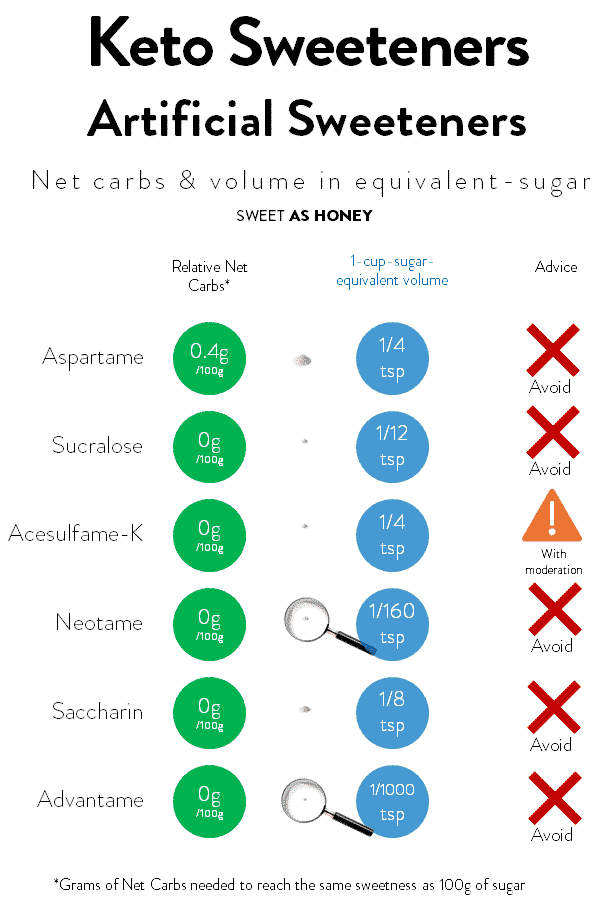
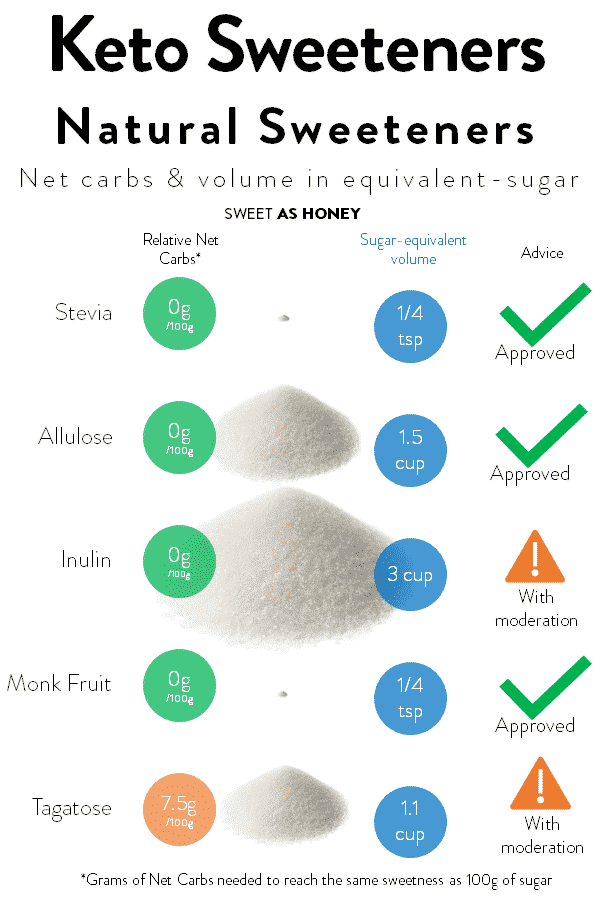
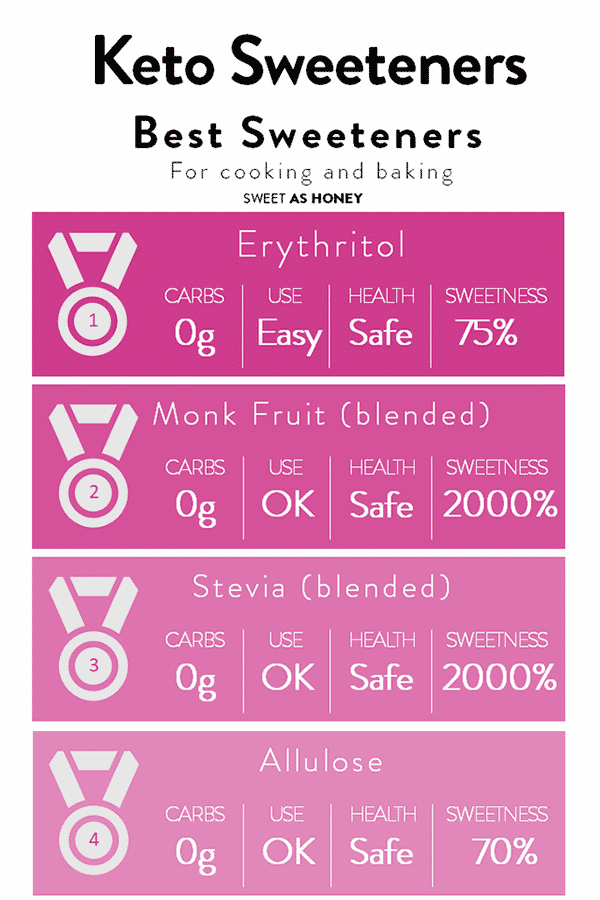




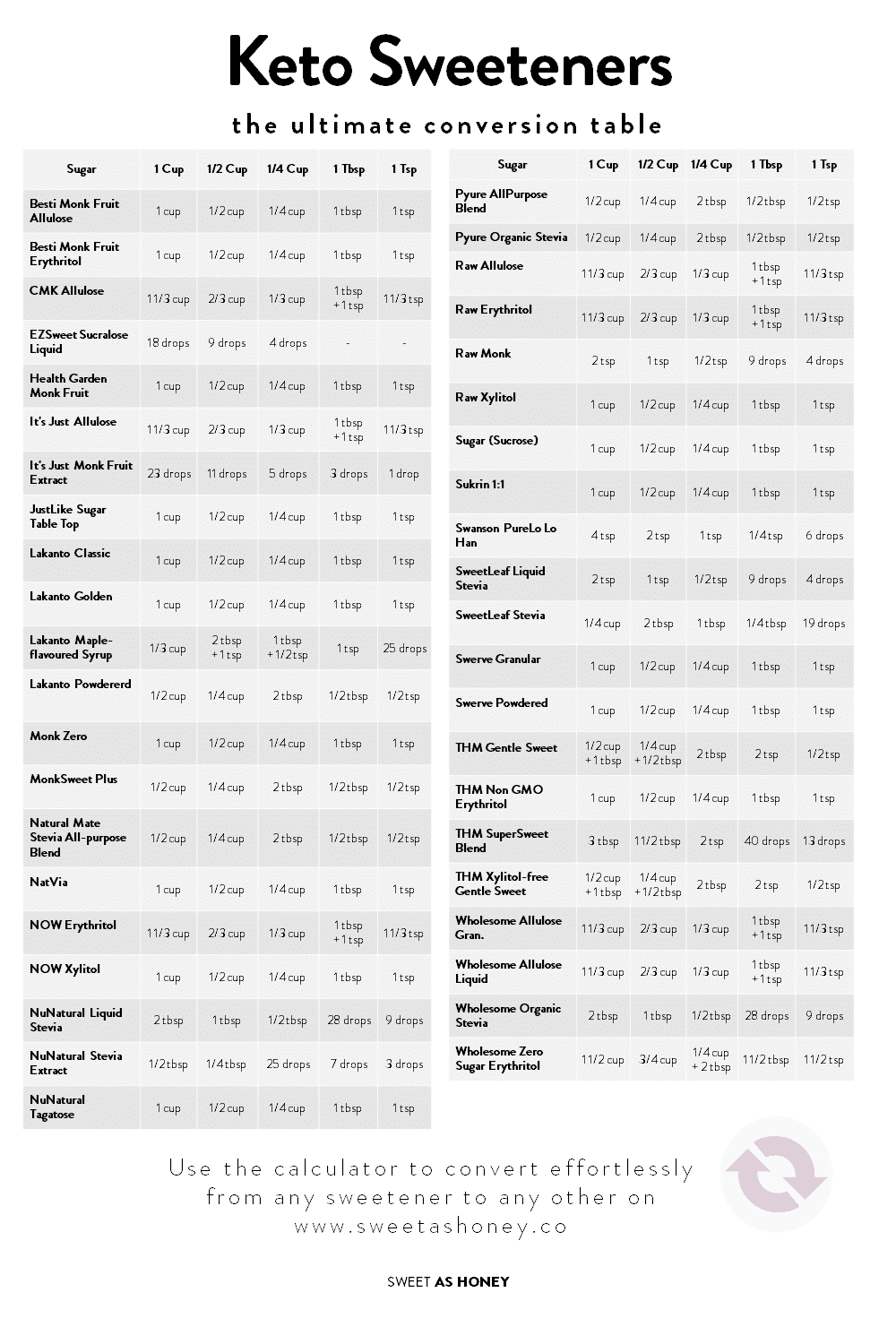

Share this post!
If you enjoyed this post, share it with your close ones!
Leave a comment
Love, love, love your Cheesecake Fluff! THANK you SO MUCH and for your kindness!
Is erythtitol a sugar alcohol?
Yes it is!
Good lord how did i not know about you !!! I have been struggling with Keto for months now…. welll no more your web site is wonderful !!!! Functionnal, pretty, tons of info and amazing recipies…. Thank you thank you, I was about to give up 😉
Thank you so much for the kind words! Have a great time baking and cooking and let me know how your recipes turn out!
Absolutely, the best site with detail, well researched information!
I would like to convert sugar into monkfruit and/or stevia. I don’t see sugar on your list
Hi Sandra,
Sugar is definitely on the list, it’s under the name Sugar (Sucrose)
Hi Carine, thank you so much for this amazing information, I’ve used so many of your recipes and you’re a lifesaver! Bless you! We went low carb/high fibre in April 2021 & my husband & I lost 1 1/2 stones each, but slowly over 4 months. I really struggle with sweeteners because I hate, hate that bitter/cold taste you get with nearly all of them. I use Nick’s (Erythritol & Xylitol) and Sukrin which doesn’t have an aftertaste, I notice you haven’t mentioned them. What are your views on these 2?
I have discovered TROO syrups, a high fibre inulin syrup which don’t have an aftertaste. Also Yacon syrup which is superb but very expensive! Wondered what your opinion was on these 2 too? Thank you so much. Heather (UK)
Yes sure Sukrin is very good too on a keto diet, I should add it to this list !
I have been trying out Monkfruit but I find the taste not quite to my liking. If I add 1-2 Splenda packets though, it tastes much better. Is this really bad for Keto? Thank you.
Could people who had cancer use all these sugar substitute?
I don’t know of any contraindication. However, I am not a medical professional and can’t give such advice, so I urge you to talk to an oncologist first.
Splenda is sucralose so it’s better to avoid on keto as it’s an artificial sweetener. Try erythritol or allulose, its a 1:1 substitute to sugar and taste like sugar.
Would it be possible to add “Better Than Sugar” Stevia granular and “Better Than Sugar” Stevia powdered sweeteners? Unless you think it’s the same as one that’s already listed. Thanks!
PS – Just baked your crispy peanut butter cookies – best keto peanut butter cookie by far; tastes like the real deal!
Hi Marie!
I’ve added Better Than Sugar to the list. It’s a very easy replacement as they combine erythritol (less sweet than sugar) with Stevia (much sweeter) to reach a 1:1 ratio.
Thanks for the suggestion!
My preferred sweetener is Better Now Stevia with inulin. It doesn’t have the aftertaste that others have. I hope it’s not too far off your approved list!
Thank you for the converter!
Can you use monkfruit drops in place of 1:1 sugar replacements for baked goods if sugar alcohols are a problem?
You can, in some recipe use Monk fruit drops instead of erythritol by the amount won’t be the same ! Mon fruit drops are extremely sweet and bitter too, so you will need only few drops, and experiment by yourself to reach your desired sweetness. Also keep in mind that monk fruit drops doesn’t add texture in baked goods, so it fail in most keto cookie recipe, keep the cookies too soft or fragile. It will work better in a cake, bread or smoothie
I made a home made white cake using granular Swerve. The cake turned out dry and dense. Is Swerve not good for backing? Any suggestions on other sweeteners to use in baking?
The sweetener can’t change the texture of the cake that much, Swerve is almost pure erythritol and works very well in cake recipes, my favorite choice.
Thank you for this wonderful information. I have bookmarked it as my go-to page for sweeteners. I always forget the ratios for recipes. Great job with this site. It’s wonderful!
Hello Carine, please do some research on apple sugar, it has very low carbohydrates and they say it caramelizes without crystallizing in the recipes, it doesn’t sugar like erythritol or xylitol
Thanks for the tips I will investigate that now!
Thank you very. well presented and researched.
What a great website! You gave me so many good ideas, and helped me understand what I need to do when I start my keto diet. Thank you so very much. I just happened upon your site and I am so grateful. I’ll pass the word around. Thanks again! Kathleen
Thank you so much for this important info. I finally had to give up suga, after being on my way, very closely to diabetes. I am doing all that I can to cut carbs. If only the general public would understand how bad sugar is, in general, we would have so many & less expensive options. Lowering my carbs has helped my blood sugar, but the low carb snack, etc., are so expensive. If we could get more people off of carbs, not on only would the obesity in this country drop, it would make the demand for better food higher and prices lower. Everyone shouldbe able to afford eat health. I list close to 15 lbs from following Keto recommendations. It is the only thing that has really worked. I look forward to more emails from you.
The first time I have seen you after years on Atkins, KETO, LCHF,etc. Love your info and the converter is RAD!
Glad you found my blog! Enjoy the keto recipes around here! XOXO Carine
Great post and comparison chart! I have used pure powered monk fruit by julian bakery in my coffee for years.
What temperature is needed to make a simple syrup from Monk fruit/Erythritol or other Keto sugars. I tried and the sugar crystallized. Thanks
Read my keto sugar free maple syrup post and recipe‘s it explain why some keto sugar free sweetener recrystallized and at which temperature. Enjoy
How to make frosting for a keto cake
You can use my keto vanilla cake frosting recipe